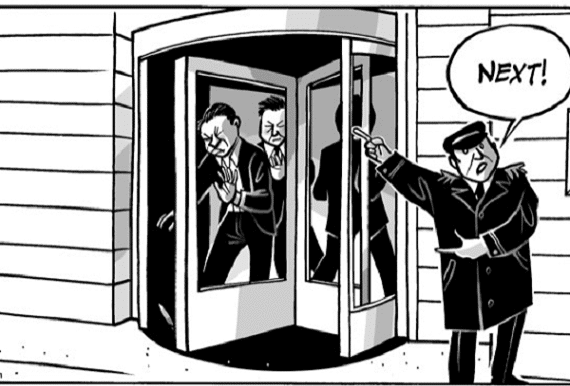New #1 Reason for Talent Turnover Crisis & What You Can Do About It
October 19, 2017
During the October Round Table meetings we discussed the “new #1 reason for talent turn over crisis and what you can do about it.”
DETROIT ROUND TABLE:
Challenge:
- No Career Path outlined and explained
- Employee wants to contribute, cannot see how
- Employee cannot connect with the greater purpose of company; just a job
- No company growth strategy-organic or acquisition
- Employee values do not match company values
- $$, benefits, leadership, conflicts, demanding culture
Solutions:
- More transparency
- Frequent assessments, evaluations, coaching
- Create family environment; eliminate “know it alls”
- Assign buddy/mentor to new hires & onboarding checklist
- Internal promotions; good coaching program
- Good leadership, purpose, mission, values
- Development program, compensation competitive or more
- Careful interview, selections- 2hour minimum: half social, half stress
Takeaways
- We struggle with confrontation, firing, etc.
- Need skills to coach, direct, develop others
- Watch how employees, guests, interview candidates treat the receptionist
KALAMAZOO ROUND TABLE (Tuesday)
Challenge:
- Individuals usually leave bosses or supervisors, not companies.
- Why?
- Millennials have shown a need for personal investment. Their training needs to be clear and comprehensive to empower them.
- New employees are “unconsciously incompetent” – “You can’t know what you don’t know.”
- Millennials are not looking to settle down as early as past generations.
- Millennials need different incentives than past generations – money is not always their motivation.
Solutions:
- Empower the employees by giving them more responsibility.
- Give clear basic training to ensure that they are confident enough to be autonomous.
- Answer the “why:” Educate the new employees on the “big picture” of the company and why their job matters. This also fosters creativity for new methods on how to do the job more efficiently.
- Mentorship.
- This helps to eliminate the issue of being “unconsciously incompetent” and empowers them to become competent.
- Have a strong on-boarding program.
Takeaways:
- Treat Millennials with more respect.
- Be willing to learn from them.
- If in a large company, empower lower-level management to connect with their employees when you can’t.
- Alleviate the issue of being “unconsciously incompetent” by continued contact and follow-up with new employees.
KALAMAZOO ROUND TABLE (Thursday)
Challenge:
- New generation is driven by a need for a purpose/mission.
- Previous generations would simply do as they were told without needing an explanation. New generation needs to know why.
- Salary is no longer the only incentive.
- Prone to leave because of management.
- There is no longer a shortage on jobs.
Solutions:
- Stay involved with your employees on a personal level.
- Keep work fun.
- Employees are people. Think of them as an individual, not as their talent or department.
- Give employees responsibility beyond their job title. Look into their passions and try to give them a special project that matches that.
- Reconnect their salary in relation to their efforts.
- Treat them the way they want to be treated. Speak to them the way that works for them, not the way that works for you.
- Clearly explain why they should want to work for you.
- Assess the fit: employers need to evaluate whether or not the individual is the right fit for the company/industry.
KALAMAZOO ROUND TABLE (Friday)
Challenge:
What is the problem?
- Lack of training
- Differing values
- “Gig economy” – look for the next big thing
- Benefits package is lacking
Solutions:
- Connect the “why” to the “what”
- Mentorship
- Build a relationship of trust
- Engage in a teaching tone rather than a criticizing tone
- Transparency – admit your mistakes
- Create meaning in their work
- Foster autonomy
- Give them purpose
- Clearly define values, roles, and expectations
- Clearly communicate the benefits of working for you
Takeaways:
- Ask how you can help
- Give affirmation / say you appreciate them
- Empower people who do their job well
- Build relationships through leadership
- Greet them every morning before beginning work
- Listen to learn, learn to improve
MARSHALL ROUND TABLE:
Solutions:
- Millennials are just people, with drivers like Gen X’ers, baby boomers, etc. They just grew up in a different societal context so they express and fulfill their needs and desires differently.
- People typically leave their boss, not their job. There may be some exceptions for lower wage earners to whom a small change in income is a really big deal.
- It is our job as leaders to build people, not just “parts” (or services, or products, or whatever).
- Employees who answer affirmatively to the following three questions are engaged, and turnover is less likely
- I get regular, meaningful feedback from my supervisor.
- I have input into my work environment.
- No place else makes me feel as good about myself as here.
- The person’s direct supervisor is the one who makes the most impact on the answers to these questions, so our job is to raise our front line leaders to think in these terms and treat their people accordingly.
- Interacting this way with people requires a genuine relationship; relationship requires understanding each employee’s drivers, whether they are a millennial, a Gen-Xer or other.
- Therefore, to reduce turnover we need to train and support our leaders at all levels to have the kind of relationships with their employees that results in an affirmative answer to the three questions above.